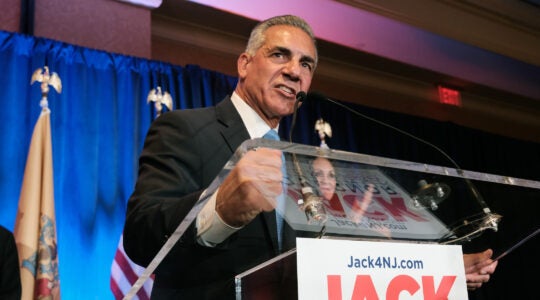Update: Vice President-elect J.D. Vance has tapped Jacob Reses to serve as his top aide in the new administration, naming his Senate chief of staff as chief of staff to the vice president, the news outlet Notus reported on Friday, Jan. 17, 2025.
Jacob Reses’ earliest political activity, as a teenager, involved campaigning to raise local taxes and denouncing the right-wing commentator Ann Coulter as “spewing hate.”
It was hardly an obvious launching pad for a career in Republican politics, but this month, Reses, 33, quietly became one of the most influential conservatives in the United States when his boss, J.D. Vance, was selected as Donald Trump’srunning mate.
Reses, Vance’s chief of staff since he entered the Senate 19 months ago, is notable for another reason: In a campaign season characterized by rising Christian nationalism among Republicans, Reses is Jewish.
Usha Vance, the potential second lady who is Hindu and Indian-American, has drawn attention from Republicans, journalists and analysts because of the ways her identities appear to be at odds with the increasingly nativist, Christian nationalist bent of the Republican Party.
But Reses, a New Jersey native whose grandfather escaped the Holocaust and who became a Republican during his first year at Princeton University — after interning for Hillary Clinton — has almost entirely escaped notice.
Reses’ steep ascendance in conservative politics has included a fellowship at the Claremont Institute; an influential role at the Heritage Foundation’s lobbying arm; and a stint in the office of Josh Hawley, the Republican senator from Missouri who calls himself a Christian nationalist, proposing that America’s political traditions are Christian in character and intent.
He is intensely private, leaving little digital record of his views, and both he and many people close to him declined to be interviewed.
But Reses’ limited public comments, coupled with insights from those who did speak and coverage of his early life in his hometown newspaper, help sketch out who he is and what he believes.
“It’s very important for us to understand all the details of anything that we pursue, but that kind of technical knowledge doesn’t matter unless it’s placed within a broader framework of ethical values,” he said in a video produced by Princeton’s alumni magazine when he graduated in 2013, responding to a question about his biggest lesson from his time in college.
He added, using watchwords of the conservative intellectual milieu into which he had recently been inducted, “I’ve really gotten a sense here of what it means to try to lead a good life and do right by others.”
When Reses was announced as Vance’s chief of staff, his mom, Karen Reses, shared an anecdote about her son’s approach to life.
“It was years ago and we were in New York one day in the Mayflower Doughnut Shop where there was a sign on the wall that read, ‘As you amble through life, brother, whatever be your goal, keep your eye on the doughnut and not on the hole,’” she said in an interview with the Press of Atlantic City. “That is the attitude Jacob has always had, to look at the big picture and not get distracted.”
The journalist Zaid Jilani met Reses in Washington a few years ago while working to get a better understanding of the new populist movement on the right embodied by politicians such as Vance and Hawley. Jilani’s conversations with Reses were off the record, but he felt comfortable saying that what Reses shares with Hawley and Vance is a politics informed by religious conviction.

J.D. Vance, then a Republican candidate for U.S. Senate in Ohio, and Sen. Josh Hawley speak with reporters at a campaign rally in Cuyahoga Falls, Ohio, May 1, 2022. (Drew Angerer/Getty Images)
The flag-bearers of the movement are known for their strongly right-wing stances on social issues like abortion, but for Jilani what stood out was their cooperation with progressive Democrats such as Elizabeth Warren on legislation aimed at curbing corporate power or lowering the price of insulin, moves dissonant with Republican free-market orthodoxy.
“Jacob is concerned about the corporate exploitation of workers and the treatment of the poor, and people being ripped offby payday lenders or drug companies,” Jilani said. “My sense is that part of the reason why this conservative populism is happening in the GOP is that people like Jacob brought a set of ideas to the table that were somewhat inspired by his religious upbringing.”
Raised in Linwood, New Jersey, Reses is the son of a pharmacist father and a mother who worked in public relations. He has two much older half-siblings from his father’s previous marriage, including Jacqueline Reses, a tech entrepreneur and bank CEO.
Reses’ maternal grandfather, Peter, immigrated to the United States in 1938 as a 15-year-old refugee from Hitler’s advance in Lithuania. According to a memoir Peter wrote and Reses’ mother later shared with the U.S. Holocaust Memorial Museum, Peter’s mother, sister and several other family members were murdered by the Nazis. Reses’ maternal grandmother, Vera Hirshberg, was a journalist who became a speechwriter for President Richard Nixon.
When Reses was growing up, his family was active in the Jewish community. A home video posted in 2007 to YouTube by a friend shows a young Reses, 7 in 1998, reciting Jewish prayers for Shabbat and leading a friend in kiddush, the extended blessing over wine. At one point, the camera sweeps up to show that he is sounding out the Hebrew words rather than reciting them from memory or reading a transliteration — a feat for a young American child.
For several years, Reses attended Trocki Hebrew Academy, a Modern Orthodox Jewish day school then operating in Margate, New Jersey. He repeatedly made the honor roll. Rabbi Mordechai Weiss, who was the principal at the time, recalled Reses as “a sweet young man.”
Weiss recalled that Reses left amid a public dispute between the school and the local Jewish federation. He also remembered that Reses’ parents may have withdrawn him because Trocki did not reflect their family’s Jewish orientation.
The Reses belonged to Congregation Beth Judah, a Conservative synagogue in Ventnor, New Jersey, that has since merged with a nearby Reform synagogue to create a congregation known as Shirat Hayam.
For Rabbi Aaron Gaber, who presided over Jacob Reses’ bar mitzvah at Beth Judah, it comes as no surprise that Reses has found success on a national stage.
“Jacob was a very smart and kind young man, taking thoughtful positions during our bar mitzvah lessons together,” Gaber recalled.
The assessment of Reses as a caring youngster tracks with the fingerprints he left in his local newspaper. At 15, for example, he was written up in a story about an internet suicide hoax. Reses had been browsing a video game website when he became alarmed at a message board discussion about a suicide that was going to happen live. He informed his mom and together they reported it to the police.
His first known political commitment also included going to bat for others. As a senior at Mainland Regional High School, from which he would go on to graduate as valedictorian, Reses campaigned to raise taxes in his community, supporting an ultimately successful $42-million referendum to pay for badly needed repairs and upgrades at the public school.
Many of the referendum’s opponents, Reses said during a town hall meeting ahead of the vote, “had their children’seducation paid for by the community — and it’s particularly unfair that they’re not voting for budgets, or the referendum … [They do] anything to keep taxes from going up, but they’re ignoring the human cost.”
When Reses left for college at Princeton, he was registered as a Democrat. Back home, a picture hung on the wall of Reses with Democratic Sen. John Kerry, according to an article in his hometown newspaper. Before finishing his freshman year he had already interned for both Kerry and Hillary Clinton, the newspaper reported.
But then his political trajectory shifted abruptly. In 2010, the summer after his freshman year, he went back to Washington, this time as an intern for Tucker Carlson’s Daily Caller website.
He later told a reporter that conversations with mentors had led him to change his outlook. He began to believe that the Republican Party is “giving a voice to disenfranchised Americans on issues like Obamacare and immigration.” Precisely what caused this shift is not known.
Coming out of high school into an economy nearing collapse during the Great Recession factored into his transformation.
“We are going to be the generation who did not get the breaks that they thought they would, and who may have trouble succeeding like they should,” he said.

A screenshot from a video produced by the Daily Princetonian, in which Jacob Reses, at left, a columnist with the newspaper, discusses campus issues with his colleague at the paper.
At Princeton, known as perhaps the most conservative Ivy League school, Reses excelled academically, majoring in public policy. He was active in the student group Tigers for Israel and organized a lobbying trip to Washington, D.C., to press lawmakers on Iran sanctions and aid to Israel.
He was concerned at the time about the prospect of the United Nations accepting a Palestinian application for membership, which would amount to an international recognition of Palestinian statehood. He argued against recognition in a column in his college newspaper in 2011, saying that such a move would leave unsolved the core disputes of the Israeli-Palestinian conflict.
“Rather than addressing these issues, the effort currently underway at the United Nations promises to complicate the peace process, leaving the Palestinians without autonomy and Israel without security,” he wrote. “In short, it will solidify the unacceptable status quo on the ground.”
He was also worried about the 2012 presidential election. In an essay for the Princeton Tory, Reses praises Mitt Romney, long considered a moderate, for embracing the politics of the Tea Party movement but worried that a loss at the ballot box would cause Republican leaders to steer the party closer to the center again.
Reses also cast Donald Trump as one of several “straw men” who “loom large in the minds of liberal journalists” and who make it easier for the media to accuse Tea Party Conservatives of “fear-ridden demagoguery.”
For Reses, at stake was not just another four years of Barack Obama in the White House, but the future of the conservative movement and the potential victory of “liberal extremism.” Reses explained the threat of liberalism to traditional American values by citing University of Notre Dame political theorist Patrick Deneen. A major influence on Reses’ future boss Vance, Deneen advocates to elevate what he sees as the traditional pillars of American society: nuclear family, shared religion, and a local, as opposed to globalized, economy.
Rounding out his college years with real-world experience, Reses completed summer internships with conservative columnist Charles Krauthammer, the Senate Budget Committee, and Judge Diarmuid F. O’Scannlain of the U.S. Court of Appeals for the Ninth Circuit.
A few months after graduating from Princeton, Reses landed the job at which he would make his name in conservative politics. He worked for Heritage Action for America, the lobbying arm of the Heritage Foundation, the influential conservative think tank behind the controversial presidential transition blueprint Project 2025.
Ahead of the 2016 election, Reses and Heritage Action tried to dissuade the Republican Party from picking Trump as its nominee. Heritage Action’s presidential candidate ratings, which Reses drafted, gave Trump a low score and top marks to Texas Sen. Ted Cruz.
When Trump appeared poised to win the nomination, Reses and his Heritage Action boss Michael A. Needham wrote an essay calling on National Review readers to double down on traditional limited-government conservatism despite the fact that Trump represented a different direction for the Republican party.
“How best to channel the current forces of disruption — to find new ways to work together, toward noble purposes — is the great question we face in politics today,” they wrote.
Reses’ primary focus at Heritage Action was pushing to repeal Obamacare, an issue he cared about since his college years. In 2017, when the Republican-controlled House approved an ultimately unsuccessful bill to take down parts of Obamacare, Reses co-wrote an essay, again with Needham, declaring the win a boost to “the task of reshaping the Republican Party into a truly conservative party.”
Reses eventually rose to become Heritage Action’s director of strategic initiatives, and in 2018, Forbes named him to its 30 under 30 list in the area of law and policy.
His experience at Heritage, a launching pad for generations of conservatives, set him up to become a senior policy advisor to Hawley when Hawley first entered the Senate in 2019. During Reses’ time with him, Hawley worked on legislation to regulate tech platforms over privacy, child welfare, and antitrust concerns. He also pushed for a tougher foreign policy stance against China.
After less than two years, Reses left Hawley’s office to enroll in Stanford Law School, where he joined the campus chapter of the Federalist Society, the group credited with bringing about a conservative supermajority on the Supreme Court. At some point, he also became a legal fellow at the Tikvah Fund, a think tank dedicated to melding Jewish tradition and conservatism. Tikvah did not return a request to speak about his time there.
In an open letter criticizing Stanford’s pandemic restrictions in late 2021, Reses questioned whether he would be forced to forgo Shabbat dinners because of the university’s rules. (He said he was vaccinated and boosted but called for a return to normalcy.)
Before Reses could complete his degree, however, Vance tapped him to be his chief of staff following his election to the Senate in 2022, which required Reses to finish his studies at Georgetown.
Karen Reses told a reporter at the time that going to work for Vance was her son’s “dream job.”
By that point, Vance had transformed from a critic of Trump to a supporter, calling him a “great president” and promoting his 2020 election denial narrative. In the Senate, Reses’ boss continued to defend Trump, while becoming known for defying GOP congressional leaders.
He sponsored populist legislation, at times teaming up with Democrats. For example, he worked with Georgia Sen. Raphael Warnock on a bill to lower the price of insulin and with Massachusetts Sen. Elizabeth Warren on limiting bank executive pay. Vance was also one of the most vocal among a growing faction of Republicans who called to scale back support for Ukraine in its defense from the Russian invasion.
Alongside his overall skepticism of foreign interventions abroad, Vance has voiced strong support for Israel.
“It’s sort of weird that this town assumes that Israel and Ukraine are exactly the same,” Vance said in a speech in May. “They’re not, of course, and I think it’s important to analyze them in separate buckets.”
Asked in 2021 if his conversion to Catholicism boosted his connection to Israel, Vance spoke of a “historical continuity between Judaism and Catholicism.” He also spoke admiringly about the role of Judaism in Israeli national politics.
A recent Politico profile of Vance mentioned Reses only in the context of his height. Most Vance staffers, the story said, are young, male and tall, “with the notable exception of his chief of staff, Jacob Reses, who walks around like Gulliver among the Brobdingnagians.”
Not much is known about Reses’ relationship with Judaism as an adult. But several years ago, in a book review, he invoked teachings from the Chabad-Lubavitch Hasidic movement, arguing for an optimistic approach to major contemporary challenges.
“There is a lesson here: when confronted with the wild in our own world, we should seek not to destroy but to subdue and harness, so as to find what is good even in what seems threatening,” he wrote.
Now, Reses is poised for an important role in the next administration, should Trump win, and a chance to put his ideas into action at the highest level of government. The situation brings to mind the parasha, or Torah portion, that Reses read on his bar mitzvah, said Gaber, the rabbi of his childhood synagogue.
“His parasha was Korach, which is certainly appropriate, given that Korach challenged Moses for leadership,” Gaber said.
JTA has documented Jewish history in real-time for over a century. Keep our journalism strong by joining us in supporting independent, award-winning reporting.






